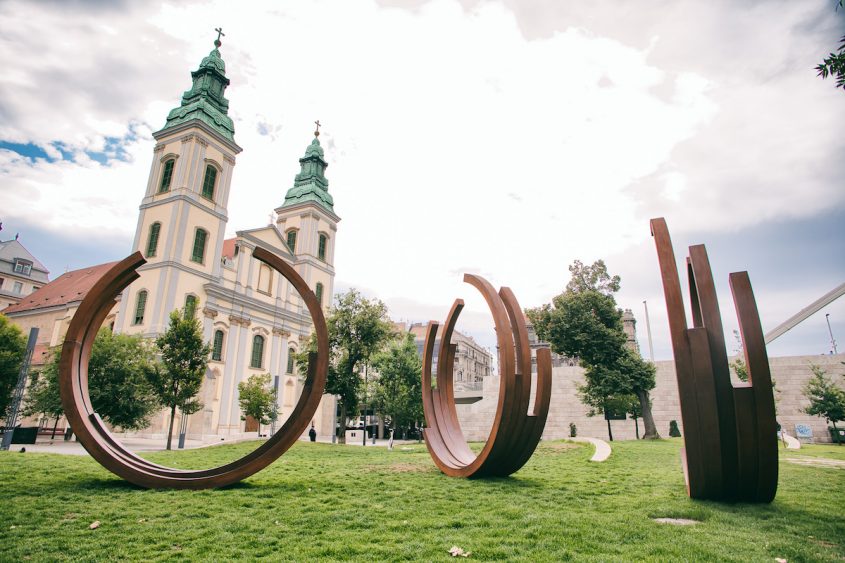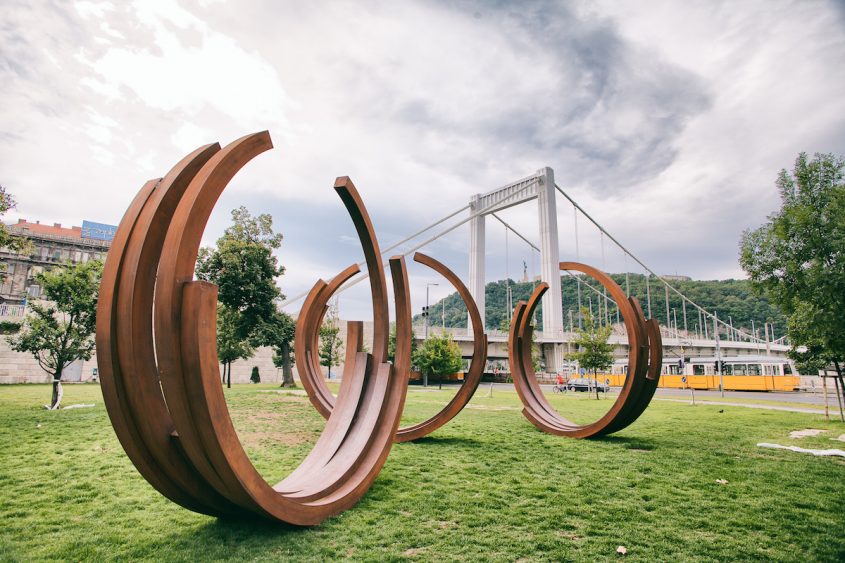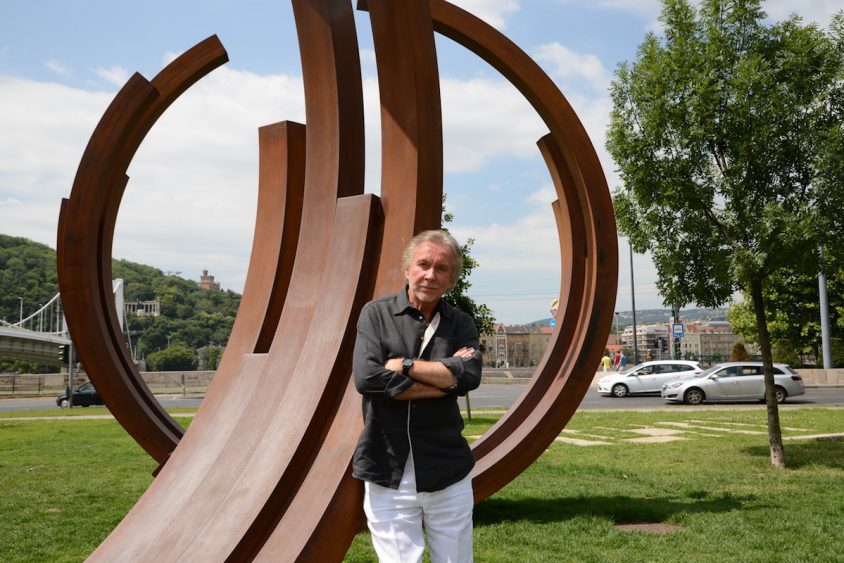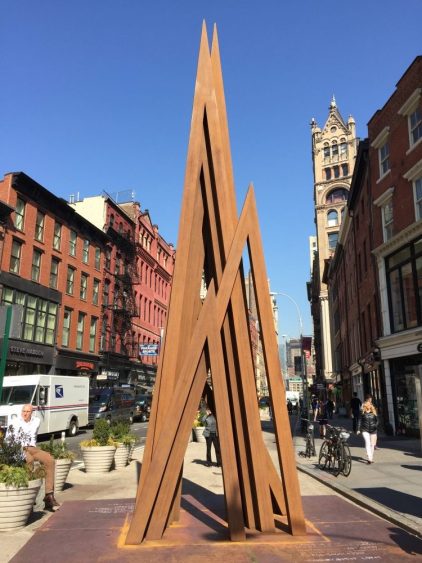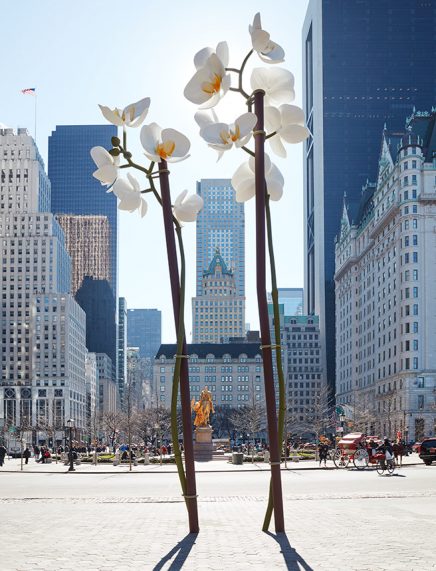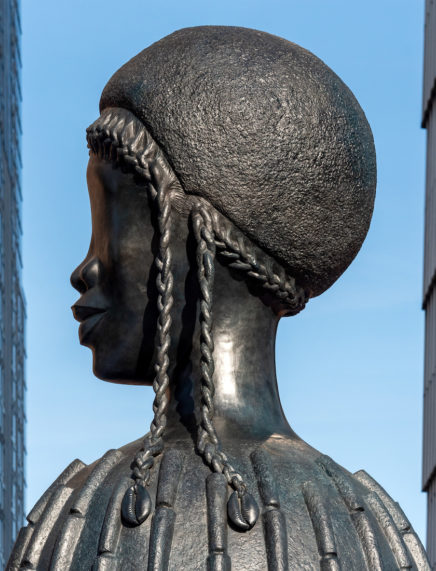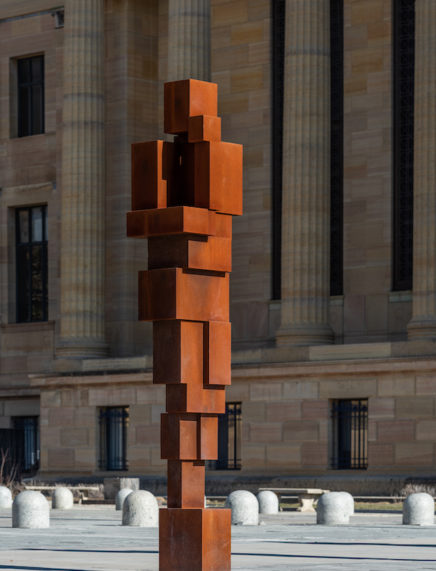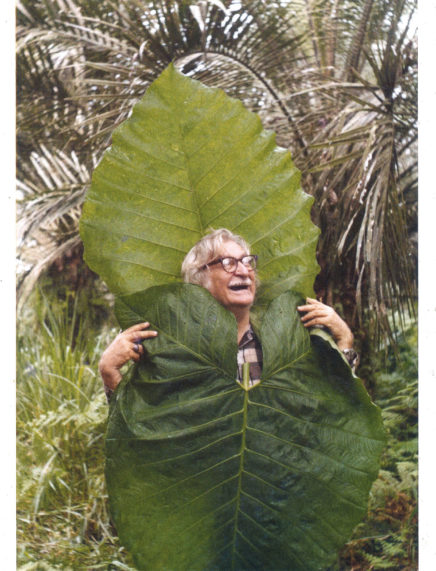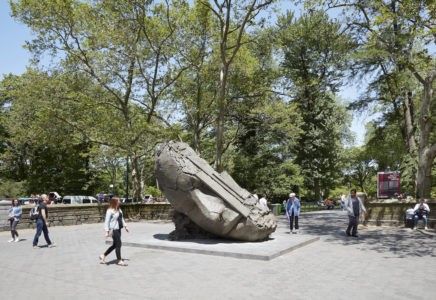Bernar Venet’s Sculptures in Public Spaces in Two Cities: Budapest and New York
Do cities have their own psyche? In a Jungian sense, they do. It is an opaque, ever pulsating plasma created by their geography, history, architecture, and the lives and stories of the individuals who populate and breathe them on the daily basis. And the only way to get to know it, to get access to it is to spend time in them. After spending a certain time in a city one can put his/her finger on its pulse, understand its psyche and discover new layers in its perception.
This writing was inspired by the fact that the large scale steel sculptures of French artist Bernar Venet can be seen on prominent public plazas in two cities, Budapest and New York, simultaneously. What’s the significance of this? For most probably not much, but the writer of these lines happened to spend most of her adult life in those two strikingly different cities and was tempted to contemplate on the parallel occurrence of the sculptures, their nature and their dialogue with their temporary surroundings.
Arcs in disorder: 3 Arcs x 4, an eight-ton steel sculpture that Venet created in 2002-2003, was installed in Budapest last October, a month before the opening of Art Market Budapest whose organizers collaborated with the local municipality in bringing the artwork to the city of bridges and of historical architecture. Placed on a busy public plaza on the Danube promenade, the three large sculptures show broken circles each multiplied by several layers. The layers are slightly shifted out of alignment creating somewhat unruly circular forms. They sit perfectly in the open cityscape on the spacious and grassy plaza where pedestrians are allowed to walk on the grass and amongst the sculptures. The sculpture was previously exhibited in various cities, last time in the gardens of Vienna’s Belvedere Palace, before they arrived to Budapest. Venet’s connection to Hungary may not be so obvious but in an interview the artist mentioned that over the past 20 years he had made his steel compositions in partnership with Hungary’s Szalai metal works. So, in a way, with the current presentation – and a solo exhibition held by the Vass László Collection in the city of Veszprém last October – , many of his sculptures returned to its country of origin.
Last month, another sculpture from Venet’s most recent series Disorder: 9 Uneven Angles was erected on one of New York’s most favored and frequented public plazas. The 26 feet high piece sits on the north-west edge of Union Square, ambitiously rising towards the sky. Nine sharply angled steel pieces vary in size and are slightly offset from one another, a common gesture in the artists formal vocabulary. With its ascending composition the sculpture smoothly slides into the city’s grid-based verticality. Even its material evokes the surrounding buildings and the entire city’s architectural skeleton. The city that is built mostly with steel on granite rocks embraces its familiar material and upward straining energy. The occasion for the public presentation of Disorder: 9 Uneven Angles on Union Square is Venet’s first solo show at Paul Kasmin Gallery in Chelsea that opened couple of weeks ago. The exhibition features other new single-angled large-scale sculptures along with smaller works, drawings and maquettes offering an insight into Venet’s artistic process. It is on view until June 18.
The two public sculptures that city dwellers can presently encounter in Budapest and in New York share their material and they are comparable in scale but otherwise they are from different periods of the artists oeuvre and represent very distinct sculptural explorations. The Arcs in Budapest are from the time when Venet worked with curves and circular lines and the Angles belong to the new experiments with single-angles. Circles commonly represent unity, wholeness, infinity and femininity. They have no beginning or end. The multi-layered broken circles of the Arcs lead us towards such associations but they elude a definitive meaning. There is no beginning or end but there are interruptions or pauses that are directed upwards, towards the sky. The slightly offset layers give the impression of continuous attempt of drawing a circle in the air but never quite finishing the gesture. Evoking but never closing the circle. Triangles on the other hand symbolize power, greatness, superiority and masculinity. They are the visual representation of “the pinnacle of success” and associated with notions such as overcoming challenges, culmination and ascension. The upright triangles of the Angles not only evoke those metaphors but in their current context they are being amplified by the surrounding city whose psyche stands on very similar psychological grounds.
The psychological dynamic of going in cycles is very different from the one that is of constantly striving upwards. The current urban backdrop to the Venet sculptures in those two cities, to me, are very expressive of those alternative motions and they somehow seem to become indexes of their current context, accentuating the underlying psyche of the hosting cities.
About the artist: Born in France in 1941, Venet created many monumental statues that are permanently installed around the world in cities such as in Paris, Berlin, Cologne, Geneva, Tokyo, Seoul, Beijing, Auckland, Denver and San Francisco. In addition to numerous private collections, his works can also be found in nearly a hundred public and corporate collections worldwide. Mr. Venet, who lives in New York, just won – along with Kiki Smith – the International Sculpture Center’s 2016 Lifetime Achievement Award. The award was established in 1991 to recognize individual sculptors who have made exemplary contributions to the field. In 2006 Venet received the award Chevalier de la Legion d’Honneur from the French State.
